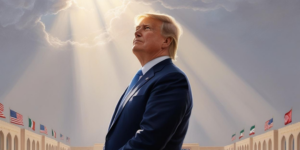Cabinet Secretaries Reveal Major Developments With China
Following President Donald Trump’s meetings with Chinese President Xi Jinping last week, the White House went beyond providing a simple readout of their discussions.
Instead, the president’s principal representatives in the discussions, Secretary of State Rex Tillerson, Secretary of the Treasury Steve Mnuchin and Secretary of Commerce Wilbur Ross briefed the press pool at Mar-a-Lago after the Chinese delegation departed Friday afternoon. What they shared were a number of major—and very positive—developments in the bilateral relationship.
Tillerson was the first to speak:
I would open by saying the president was very happy to host President Xi at Mar-a-Lago these last two days. As those of you that have been here know, it was obviously a perfect weather day today, and it was a great opportunity for both the presidents and their wives to really get to know one another and enjoy, share meals together, and work on important issues.
Each side did bring along senior delegations of officials—so, of course, we’re represented here—who also were able to build important relationships for a lot of work that’s still ahead of us.
I think what I would really want you to get a grasp of is that both the atmosphere, the chemistry between the two leaders was positive. The posture between the two really set the tone for our subsequent meetings between our high-level delegations. And I would tell you the exchanges were very frank. They were candid, they were open, and they were very positive. So I think all of us are feeling very good about the results of this summit in terms of what it did for setting a very constructive tone going forward.
The two leaders had positive, productive meetings. President Trump and President Xi agreed to work in concert to expand areas of cooperation while managing differences based on mutual respect.
The two presidents reviewed the current state of the bilateral relationship and noted the importance of working together to generate positive outcomes that would benefit the citizens of both of our countries. President Trump noted the challenges caused by Chinese government intervention in its economy and raised serious concerns about the impact of China’s industrial, agricultural, technology and cyber policies on U.S. jobs and exports. The president underscored the need for China to take concrete steps to level the playing field for American workers, stressing repeatedly the need for reciprocal market access.
The two sides noted the urgency of the threat of North Korea’s weapons program, reaffirmed their commitment to a denuclearized Korean Peninsula, and committed to fully implement U.N. Security Council resolutions. They agreed to increase cooperation and work with the international community to convince the DPRK to peacefully resolve the issue and abandon its illicit weapons programs.
The two sides had candid discussions on regional and maritime security. President Trump noted the importance of adherence to international norms in the East and South China Seas and to previous statements on non-militarization. He also noted the importance of protecting human rights and other values deeply held by Americans.
The two presidents agreed to elevate existing bilateral talks to reflect the importance of making progress on issues. They established a new high-level framework for negotiations. The U.S.-China Comprehensive Dialogue will be overseen by the two presidents, and it will have four pillars: the diplomatic and security dialogue; the comprehensive economic dialogue; the law enforcement and cybersecurity dialogue; and the social and cultures issues dialogue.
The two sides agreed to undertake an ambitious agenda and schedule to show progress and achieve meaningful results. President Trump welcomed President Xi’s invitation to visit China for a state visit at a future date. They agreed to work together in the interim to ensure successful and results-focused visits.
He then handed the briefing over to Mnuchin, who said:
I would just like to reiterate that we had a very productive two days with our counterparts. And specifically, we had a meeting this morning that was a breakout of the first comprehensive economic dialogue. We had very direct and frank conversations about how we would work together. Secretary Ross and I will be leading that jointly, and we will be focused on trade, investment, and other economic opportunities between both companies—countries.
We focused specifically on a more balanced economic relationship, specifically on trade. And we focused on the desire to have very specific action items, both in the short term for the next time we get together, as well as what the goals are over the year. So I think we think the restructuring of the dialogue and having specifically a breakout that will address comprehensive economic opportunities across our different agencies both here and within China I think we felt was very productive, very good start in how we’re going to structure it, and again, very specific things that we talked about to look forward on making progress in the short term on.
Ross then concluded the briefing with a short statement:
I think in many ways, the most significant thing was a 100-day plan. Normally, trade discussions, especially between China and ourselves, are denominated in multiple years. This was denominated in the first instance in 100 days with hopefully way stations of accomplishment along the way. Given the range of issues and the magnitude, that may be ambitious, but it’s a very big sea change in the pace of discussions. And I think that’s a very, very important symbolization of the growing rapport between the two countries. {eoa}






































